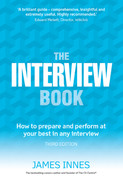Distance interviews
There’s no rule that says you have to attend in person for an interview.
Telephone interviews have been commonplace for decades. With the advent of technologies such as video-conferencing and the Internet, an employer at one end of the country can now easily and immediately interview a potential employee at the other end.
I call such interviews ‘distance’ interviews and in this chapter we’ll look at how you should handle them.
Telephone interviews
Telephone interviews are most commonly used as a shortlisting technique, to whittle down a large number of applicants to a final shortlist that will be called in for face-to-face interviews. As such, they are more commonly used for first interviews, rather than second or third interviews. However, if you are widely geographically separated from your interviewer then it may be more convenient to conduct the entire process by telephone. It all depends on the employer.
A telephone interview is similar to a one-on-one interview. The main difference is that you won’t, of course, have any visual cues – and neither will they. Issues such as dress sense and body language are immediately irrelevant but most of my other interview advice still applies.
In particular, you need to concentrate on articulating clearly and getting your tone of voice right. The interviewer might not be able to see you smiling but they will be able to hear it in your voice – and they’ll also be able to hear a frown!
BLOOPER!
When I was very much younger, I allowed myself to be interviewed by telephone with my rather rude African Grey parrot within earshot! And one indignant interviewer reported to a survey that he once had a candidate flush the lavatory on him during a telephone interview!
Do be careful of background noises and try to conduct the interview somewhere calm and quiet, rather than on a busy street corner! You should especially avoid eating, drinking, smoking or chewing gum during the interview, as all of these will be distinctly audible. The only exception to this would be for you to take an occasional sip of water to stop your mouth drying up.
Whilst there’s nothing wrong with taking a copy of your CV (or application form) or other notes into any interview, a telephone interview makes this much easier. You can lay out all your papers neatly in front of you, so you can put your finger on the precise document you need at a moment’s notice.
- CV or application form
- Job advert, description or person specification
- A list of the key selling points you want to make
- A list of the questions you would like to ask
- Diary or calendar to schedule a follow-up interview
Whilst it’s always better if the interviewer doesn’t know that you’re referring to notes, it is much more socially acceptable to refer to papers when you are on the phone than when you are sitting face to face in a formal interview setting.
TOP TIP
It will also be much easier for you to take notes yourself – especially if you have a hands-free or loudspeaker facility on your telephone. By taking brief notes as you go along, you can rely on them later when attending a second or third interview – or even use them to help prepare yourself for other interviews.
If the interviewer has arranged to call you:
- Ensure you provide them with the correct telephone number.
- Ensure you are fully prepared and ready to answer at the designated time.
- Ensure that nobody else answers the call.
If the interviewer has asked you to call them:
- Ensure you have the correct telephone number.
- Ensure you call at precisely the time they have designated.
- Ensure you leave a message if you are unable to get through.
Video-conferencing and webcam-based interviews
More and more employers are looking to harness tools such as video-conferencing and the Internet to facilitate the interviewing process.
If meeting in person is impractical (or, for whatever reason, undesirable) then, provided both you and your interviewer have access to appropriate technology, you might find yourself expected to participate in such an interview.
First and foremost you need to ensure you fully understand how to use the technology in question. It will not create a good impression if you agree to an interview of this nature and then struggle to deal with the technology.
Apart from this, such interviews are very little different from ‘traditional’ interviews. You will be in full view of the interviewer (or interviewers) so dress appropriately, maintain a reasonable level of eye contact, smile, articulate clearly, and behave precisely as you would in any other interview.
Because you will be responsible for controlling your own environment, make sure that nobody disturbs you during the interview. If somebody walks in on you during the interview, then it is going to reflect very badly on you. This also means switching mobile phones to silent mode and taking other phones off the hook.
